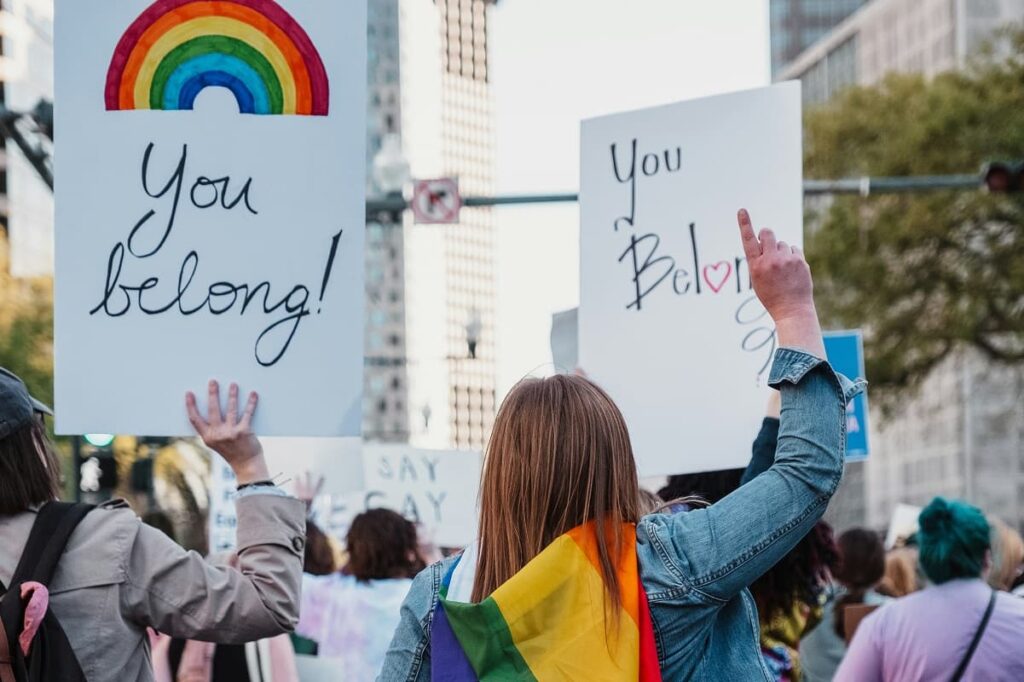
If the reactions to our country’s transformed presidential race have taught us anything, it’s that people desperately want to be for something. Too often, we’re defined by what we’re against. But this summer we saw a jolt of enthusiasm from people eager to be a part of something fresh, exciting, even joyful.
Now I’ll admit, I’m as guilty as the next person of getting hung up on the things I’m against. Every morning I see the evidence that my news feed has been trained on outrage. I’ve “hate watched” speeches and interviews and debates. I’ve found myself fueled by negativity.
But while it feels good in the moment, fixating on what we’re against doesn’t get us very far. It might draw nods and snaps from people who already agree with us, but it doesn’t win new people to our side. It doesn’t inspire. What inspires is a positive vision for the future – one that holds the door open for others to join.
I learned this lesson the hard way.
My introduction into LGBTQ advocacy wasn’t rooted in a positive vision. It was rooted in anger.
When I first came out as a gay man at a small Christian college in Iowa, I hoped it wouldn’t be a big deal. But I was student body president and a leader in our campus chapter of a Christian student group. When the national organization made the decision to kick me out, it made the front page of The Des Moines Register.
My ability to tell my own story, on my own terms, was taken away from me. The student body was split, and many folks I considered longtime friends didn’t stand up for me. I was mad. I was hurt – justifiably so. And I didn’t want other LGBTQ young people to experience the same hurt I did.
This was the motivation that fueled my early days of advocacy. In my head, I was trying to motivate people. I wanted to inspire existing allies to speak up and persuade new ones to join our cause. But my anger wasn’t persuasive.
For the people who might’ve been willing to have an honest conversation – maybe even open to changing their mind – I shut the door to meaningful engagement. I made them defensive and, as a result, dismissive.
Since then I’ve learned a lot about how to open doors for new allies.
I’ve learned that we don’t inspire people through a sense of vengeance or victimhood. We inspire by creating connections and sharing visions for a better future.
I’ve seen examples of this firsthand. I had the privilege of knowing Urvashi Vaid, who served on the Gill Foundation’s board. Urv is remembered as a firebrand, but she was also warm and joyful and loved to laugh. How else would you end up marrying a comedian? To this day, her wife Kate Clinton shows us how to lift up the LGBTQ experience through humor and laughter.
As much as Urv was a radical visionary, she was a pragmatic optimist who brought others along with her to join the fight for equality. And our community is better and freer because of Urv’s inspiration.
There are many LGBTQ leaders carrying forward Urvashi’s legacy. As the new CEO of the Trevor Project, Jaymes Black shows us what it means to live and lead with joy, openness, and optimism. NCLR’s Shannon Minter shows us how to approach everyone – even those who might not yet be on our side – with warmth, understanding, and a belief that we can all learn and grow.
Today, I find myself thinking a lot about our positive vision for the future.
It’s easy to name what we’re against – injustice, discrimination, hate. But what are we for? At the foundation, we try to name these things as the guiding principles we’ve drawn from Tim Gill’s influence.
We believe in learning and growth, the idea that people are capable of change. Tim has said we should think of the world in terms of friends and “future friends” – those who are still on their journeys toward acceptance and understanding and might get there more quickly if we treat them with compassion.
We also believe in expanding our pool of allies and forging pragmatic partnerships. We don’t have to agree with someone about everything in order to work together to meaningfully advance equality. We can’t let “perfect” be the enemy of progress. As Tim put it, “every increment of justice you make, makes someone’s life better. And it makes their life better now, not in some utopian future.”
We have to embrace imperfect progress. That doesn’t mean we leave our values behind, and it certainly doesn’t mean we leave anyone in our community behind. But it’s a recognition that on the long path to full equality for LGBTQ Americans, there’s plenty we can do right now to take us another step closer.
Today, I try to find my motivation in focusing on the things I’m for – not the things I’m against. I try my best to inspire people to join our cause – not shame them for failing to do it sooner. I try not to let my passion be rooted in anger, but in hope that things can be a little better tomorrow than they are today.
